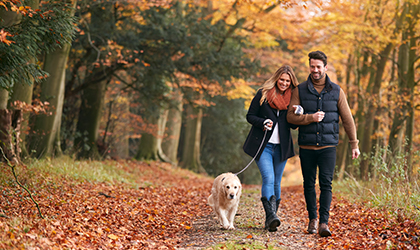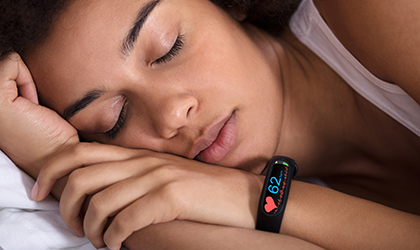
Over the past year, it’s become increasingly apparent that Covid-19 can’t only make our bodies unwell; its implications can gravely affect our minds, too. The loneliness, grief, fear, health anxiety, and loss of income that have come to define the pandemic have had – and continue to have – a monumental impact on our collective psyche and wellbeing.
Admittedly, there’s a lot to feel bleak about in the present climate. As if the threat of living with an invisible, potentially deadly virus isn’t anxiety-inducing enough, lockdown has also ushered in acute social isolation, disconnection, and fatigue – all of which are taking a sizeable toll on our mental health.
In light of these wild and woolly times, it’s not surprising if you’re finding things challenging right now. In fact, it’s a perfectly natural response. And you certainly aren’t alone.
The Covid burnout is real
We only need to look at the secondary trauma and stress experienced by healthcare workers, the exacerbation of traditional gender roles in some homes (especially for working mothers), the chaotic juggling of remote working and childcare, the endless financial struggle, and the preachy calls to be productive to know that life in lockdown has created a perfect storm for burnout.
The three pillars of burnout
There are three components of burnout: emotional exhaustion – the fatigue that comes from carrying too much for too long; a decreased sense of accomplishment – the unconquerable sense of futility that nothing you do makes any difference; and depersonalisation – the depletion of empathy, caring and compassion.
All emotions are valid
Remind yourself that everything you feel right now is valid. We’re all weathering the same storm. Try not to repress your emotions under the misguided belief that there are people ‘worse off than you’. It’s okay not to feel okay, whatever your circumstance.
The jam jar analogy
Everyone has mental health. And we all shift along the spectrum of mental health throughout our lives. The mental health ‘jam jar’ analogy tries to encapsulate this idea. Two different vulnerability factors can fill your jar: genetic factors and environmental factors. When the jar is full, we actively experience an episode of mental illness. At present, the stressors linked to the Covid crisis have caused many of our jars to overflow.
Support your wellbeing
Now that the gung-ho camaraderie and novelty of the first lockdown is out of sight – and the pandemic fatigue has well and truly sunk it – looking after your noodle has never been more important. Supporting your wellbeing doesn’t have to be complicated. Sometimes, caring for your mind at the moment could mean giving yourself permission to relax on the sofa in front of Netflix.
Have a small daily routine
‘Uncertainty’ has become the word of the past year. And a lack of certainty is one of our biggest anxiety-creators. A simple way to ease this stress is to follow a manageable daily routine that provides structure, purpose and – that catchall phrase – certainty. Indeed, while we can’t control the virus, we can control what we do each day. Think of these rituals as the buoys that keep us afloat when the waters are rough.
Watch out for pandemic pressure
Not only are we in the tight grip of a global pandemic, but we’re also battling a burgeoning ‘infodemic’: an age of information overload. And there’s no shortage of advice on how to cope with and navigate through the Covid crisis. But calls to get super fit, be productive and bake banana bread by the bucket load can be overwhelming. Remember, there’s no correct way to get through this strange time. We all manage in varying ways. And whatever tools you choose to use are fine.
Lower the bar
Don’t bulldoze yourself into making a sourdough starter or emerging from lockdown with an Instagram-ready physique if you don’t have the energy. These are the most important things to do throughout the pandemic: look after yourself (and others if you can), stay safe and take care of your mental health. Allow yourself to slow down and do less.
Be kind to yourself
Try not to beat yourself up if you feel low right now. You feel rubbish because, well, life is hard. Shaming yourself for feeling natural emotions only heightens stress and perpetuates anxiety. On the other hand, practising compassion and unconditional self-acceptance helps to soothe you in times of crisis.
Practice gratitude
Gratitude is a tried-and-tested antidote for stress and anxiety. Studies consistently demonstrate that people with higher levels of gratitude experience higher personal happiness levels.(1) Cultivating gratitude encourages you to feel more positivity, deal with adversity and build stronger relationships. Consider writing three things you’re grateful for every morning to set you up for the day ahead. Try to feel the gratitude permeating through your body as you do.
The anxiety cycle
Anxiety often operates in a perpetual cycle of panic and doom. And when you’re in the throes of this, your body’s sympathetic nervous system – responsible for the ‘fight, flight or flee response’ – kicks into gear. This reaction launches a cascade of physiological reactions: your palms sweat, your gut clinches, your breathing speeds up, your hands shake.
Use the Internet wisely
In many ways, we’re lucky to experience a global pandemic in such a golden age of technology. Netflix, Zoom and WhatsApp have become lifelines for many of us; a means to stay connected in a disconnected world. That said, it’s still vital to think about what online content you grant access to your precious brain space. Don’t let bad news, misinformation and social media eat into your already-drained resources.
Quick exits off the anxiety cycle
To get off the anxiety cycle, you need to de-escalate the sympathetic nervous system and engage the parasympathetic nervous system, which is responsible for the ‘rest and digest response’. In short, you need to change your physiology. Next time you feel the onset of pandemic- panic, try one of these quick releases:
-
Have a good cry
-
Hug someone you’re living with
-
Have a hot bath or cold shower
-
Watch a funny video and roar with laughter
-
Shake your body vigorously for one minute
-
Get up and dance
-
Call a good friend
-
Write all your worries down
-
Practice deep belly breathing
-
Do some yoga
-
Try five minutes of meditation
-
Sing!
If in doubt, breathe it out! Pushing out from your diaphragm (belly), breathe in for five counts, hold for five counts, and breathe out for ten counts, contracting your diaphragm.
If you want to remain abreast of what’s going on, that’s fine. But try to only consume the news once per day and avoid watching or reading it two hours before bed.
Banish the lockdown winter blues
Pandemics aside, many of us already find the winter months hard. The shorter days, lack of sunlight, and colder weather can leave us feeling a bit ‘meh’ and send us running into hibernation. It makes sense, then, that facing a lockdown in winter may deplete our already-compromised tank. With that in mind, it’s vital to take extra care of yourself at the moment.
Get lots of natural light
Exposure to sunlight – especially in the morning – helps calibrate our 24-hour internal clock, otherwise known as our circadian rhythm, which governs our sleep-wake cycle. A short morning stroll (even if it’s grey outside) may support your rest, mood and overall wellbeing.
Take time to rest
We need to reframe what rests looks like. Taking rest when you need it isn’t slothful or lazy or idle; it means your body is simply craving recuperation. If watching a film allows you to recharge, then it’s a necessity right now. Full stop.
Ask for help
Remember, ‘no man (or woman) is an island’. We all need support from others. And asking for help isn’t a failure or weakness; it’s a basic human need to help us survive. If you’re struggling, always reach out to a friend, family member, GP, or therapist.
Plan daily pockets of joy
Although weekends feel arbitrary, we shouldn’t let lockdown get in the way of planning fun activities. And we don’t mean organising a gazillion Zoom quizzes (they were so lockdown 1.0). Instead, try to fill your daily calendar with at least one source of pure, unadulterated joy:
-
Watch a TV show at the same time as a friend
-
Indulge in a long, hot lockdown bath
-
Call a family member and tell them you love them
-
Cuddle your pet
Be extra gentle with yourself
In the current climate, we have fewer resources available to support our mental health. More than ever, we need to be gentle with ourselves. Can’t face a long walk in the rain? Can you get outside for a quick stroll around the block? Can’t stomach another Zoom party? Can you send a brief voice note to a friend? Can’t manage a 9-5 WFH day? Can you try 10-6 instead?
Brain food
Alongside making small, manageable lifestyle changes, you may wish to consider the following nutrients to give your emotional health an extra nudge during lockdown.
St John’s Wort
A perennial plant with yellow, star-shaped flowers, St John’s Wort is a traditional herbal remedy used for the relief of mild anxiety and slightly low mood.
L-theanine
Most people are familiar with that nice-cuppa-tea feeling. It just so happens the amino acid, L-theanine, may be responsible for making the nation’s favourite brew oh-so-soothing.
Magnesium
Magnesium is colloquially known as ‘nature’s tranquilizer’ thanks to it contributing to normal psychological function, which may prove especially helpful at this time.
Siberian Ginseng
Siberian Ginseng is arguably the best-kept secret of the nutritional world. This herb helps to maintain that ‘get up and go’ feeling, but, crucially, doesn’t contain caffeine.
Ashwagandha
Ashwagandha is a revered herb of the Indian Ayurvedic system of medicine. This herb is often referred to as ‘Indian Ginseng’ since it possesses similar properties.
5-HTP
5-hydroxytryptophan, or 5-HTP, is the natural compound the body manufactures from the amino acid, tryptophan. The brain then converts 5-HTP into serotonin – our ‘feel-good’ hormone. For this reason, 5-HTP may be a useful addition at this time.
Rhodiola Rosea
Rhodiola Rosea has been used for centuries. It’s the perfect partner to Siberian Ginseng, magnesium and L-theanine – why not go online to read more about this special nutrient.
We must try, at least, to remain optimistic and excited about the future, even if it feels like a Herculean task.
References:
-
Harvard Health Publishing. (2011) Giving thanks can make you happier. Harvard Health. Available online: https://www.health.harvard.edu/healthbeat/giving-thanks-can-make-you-happier
Other sources:
-
Hachette.co.uk. 2021. How to stay calm in a global pandemic. Available online: https://www.hachette.co.uk/wp-content/uploads/2020/12/How-to-Stay-Calm-in-a-Global-Pandemic-Free-ebook.pdf
Related Posts
Disclaimer: The information presented by Nature's Best is for informational purposes only. It is based on scientific studies (human, animal, or in vitro), clinical experience, or traditional usage as cited in each article. The results reported may not necessarily occur in all individuals. Self-treatment is not recommended for life-threatening conditions that require medical treatment under a doctor's care. For many of the conditions discussed, treatment with prescription or over the counter medication is also available. Consult your doctor, practitioner, and/or pharmacist for any health problem and before using any supplements or before making any changes in prescribed medications.

Christine
Christine Morgan has been a freelance health and wellbeing journalist for almost 20 years, having written for numerous publications including the Daily Mirror, S Magazine, Top Sante, Healthy, Woman & Home, Zest, Allergy, Healthy Times and Pregnancy & Birth; she has also edited several titles such as Women’ Health, Shine’s Real Health & Beauty and All About Health.
View More



